教学课件 --冀教版中学英语七年级(下) UNIT1 Unit Review
文档属性
| 名称 | 教学课件 --冀教版中学英语七年级(下) UNIT1 Unit Review | 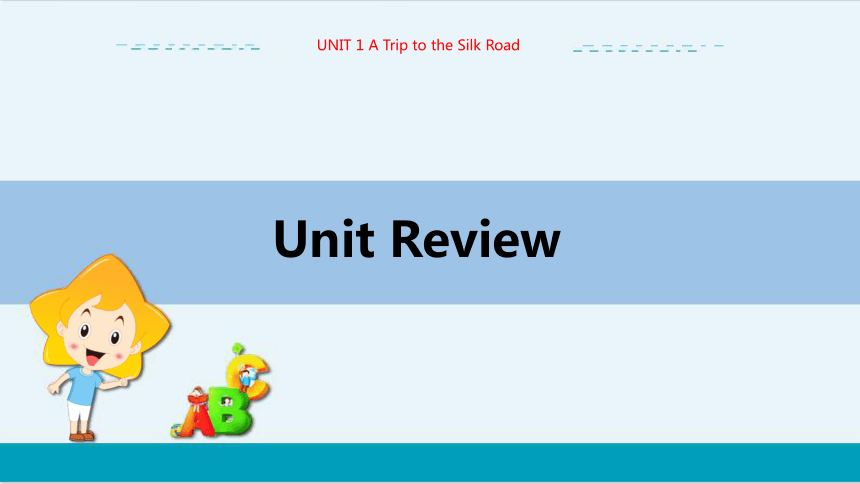 | |
| 格式 | pptx | ||
| 文件大小 | 9.1MB | ||
| 资源类型 | 试卷 | ||
| 版本资源 | 冀教版 | ||
| 科目 | 英语 | ||
| 更新时间 | 2024-02-21 19:48:13 | ||
图片预览


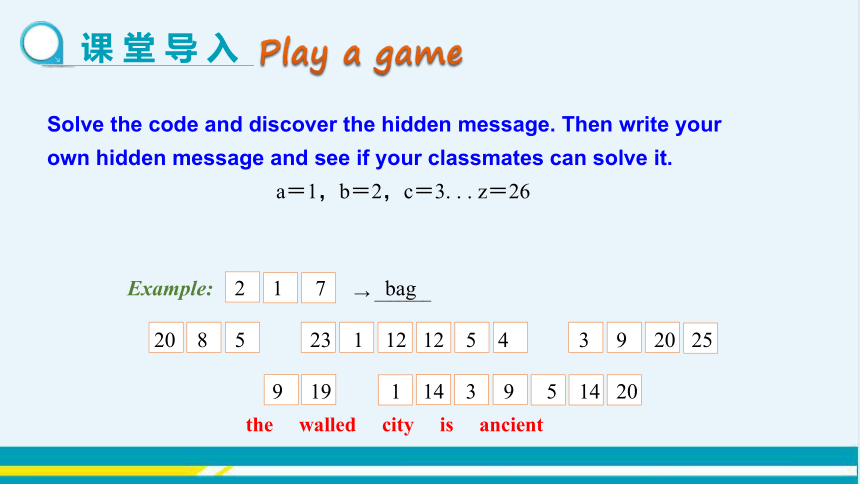
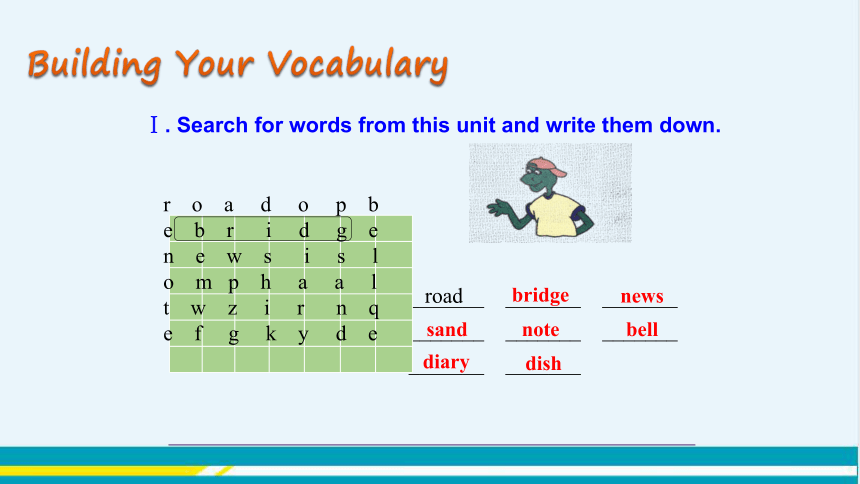
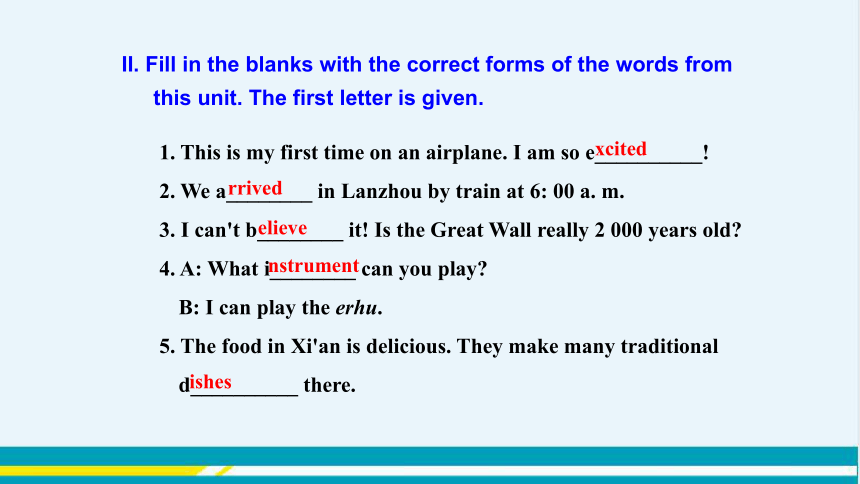
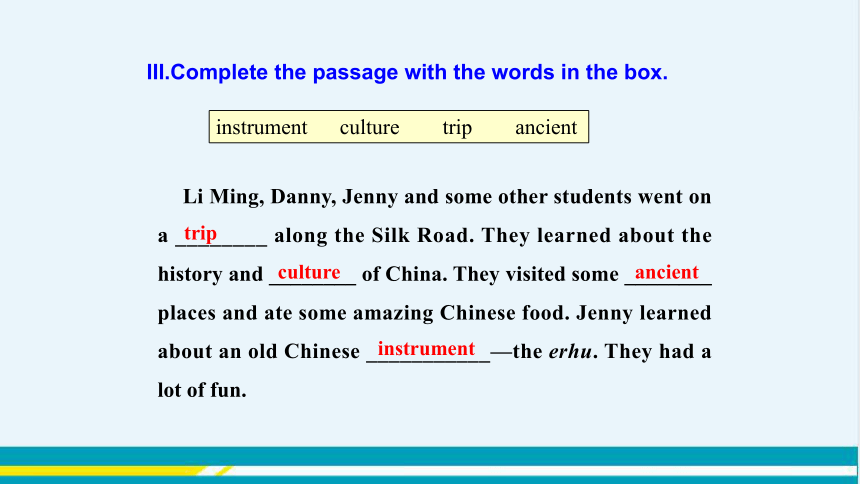
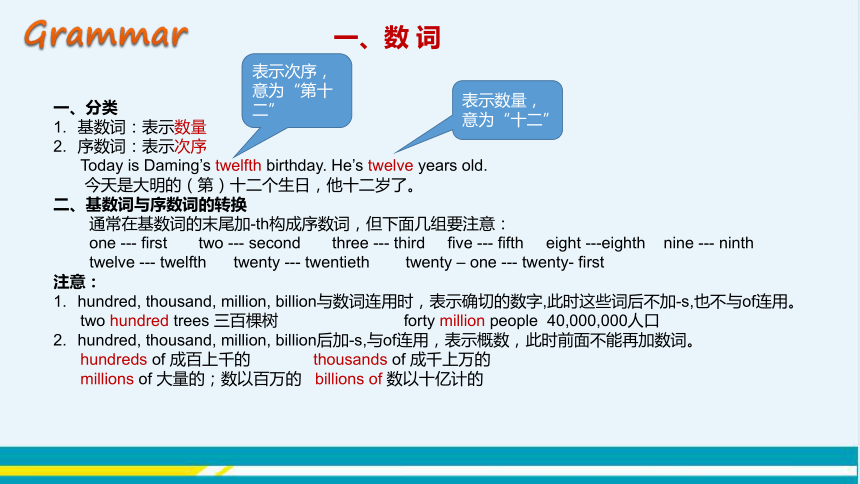

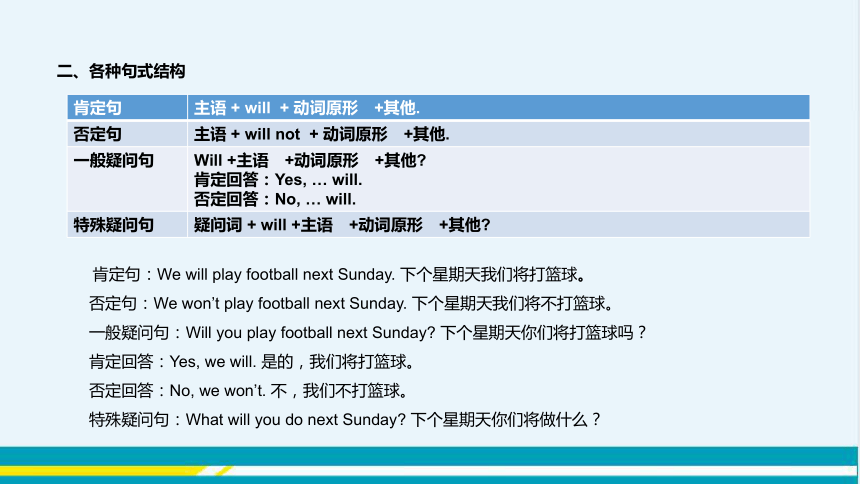
文档简介
(共29张PPT)
Unit Review
UNIT 1 A Trip to the Silk Road
学 习 目 标
掌握本单元新学的单词、短语和句型;
掌握本单元的语法:数词和will的用法。
1
3
了解并学习丝绸之路沿线城市的名胜及其深厚的文化,开阔了学生的视野,感受祖国丰富的文化底蕴,增强了他们的民族自豪感。
能够运用所学句型表达请求和许可。
2
Solve the code and discover the hidden message. Then write your own hidden message and see if your classmates can solve it.
a=1,b=2,c=3. . . z=26
Play a game
→ _______
Example: 2 1 7 bag
20 8 5 23 1 12 12 5 4 3 9 20 25
9 19 1 14 3 9 5 14 20
the walled city is ancient
课 堂 导 入
Building Your Vocabulary
Ⅰ. Search for words from this unit and write them down.
_______ _______ _______
_______ _______ _______
_______ _______
r o a d o p b
e b r i d g e
n e w s i s l
o m p h a a l
t w z i r n q
e f g k y d e
road
bridge
news
sand
note
bell
diary
dish
II. Fill in the blanks with the correct forms of the words from this unit. The first letter is given.
1. This is my first time on an airplane. I am so e__________!
2. We a________ in Lanzhou by train at 6: 00 a. m.
3. I can't b________ it! Is the Great Wall really 2 000 years old
4. A: What i________ can you play
B: I can play the erhu.
5. The food in Xi'an is delicious. They make many traditional d__________ there.
xcited
rrived
elieve
nstrument
ishes
plete the passage with the words in the box.
Li Ming, Danny, Jenny and some other students went on a ________ along the Silk Road. They learned about the history and ________ of China. They visited some ________ places and ate some amazing Chinese food. Jenny learned about an old Chinese ___________—the erhu. They had a lot of fun.
trip
culture
ancient
instrument
instrument culture trip ancient
一、数 词
一、分类
基数词:表示数量
序数词:表示次序
Today is Daming’s twelfth birthday. He’s twelve years old.
今天是大明的(第)十二个生日,他十二岁了。
二、基数词与序数词的转换
通常在基数词的末尾加-th构成序数词,但下面几组要注意:
one --- first two --- second three --- third five --- fifth eight ---eighth nine --- ninth
twelve --- twelfth twenty --- twentieth twenty – one --- twenty- first
注意:
hundred, thousand, million, billion与数词连用时,表示确切的数字,此时这些词后不加-s,也不与of连用。
two hundred trees 三百棵树 forty million people 40,000,000人口
hundred, thousand, million, billion后加-s,与of连用,表示概数,此时前面不能再加数词。
hundreds of 成百上千的 thousands of 成千上万的
millions of 大量的;数以百万的 billions of 数以十亿计的
表示次序,意为“第十二”
表示数量,意为“十二”
Grammar
二、will的用法
一、含义
“will+动词原形”构成一般将来时态,表示将来某个时间发生的动作或存在的状态,也可表达对将来的预测。will本身没有人称和数的变化。in the future, “in+一段时间”,tomorrow, next week等常与一般将来时态连用。
No one will do heavy work in the future.
将来没有人做沉重的工作。
We will be busy tomorrow.
明天我们将很忙。
I’ve got it!
二、各种句式结构
肯定句:We will play football next Sunday. 下个星期天我们将打篮球。
否定句:We won’t play football next Sunday. 下个星期天我们将不打篮球。
一般疑问句:Will you play football next Sunday 下个星期天你们将打篮球吗?
肯定回答:Yes, we will. 是的,我们将打篮球。
否定回答:No, we won’t. 不,我们不打篮球。
特殊疑问句:What will you do next Sunday 下个星期天你们将做什么?
肯定句 主语 + will + 动词原形 +其他.
否定句 主语 + will not + 动词原形 +其他.
一般疑问句 Will +主语 +动词原形 +其他
肯定回答:Yes, … will.
否定回答:No, … will.
特殊疑问句 疑问词 + will +主语 +动词原形 +其他
三、will与be going to的区别
1.“will+动词原形”表示客观上将要发生的事情。
They will visit a lot of interesting places.他们将参观许多有趣的地方。
2.“be going to +动词原形”表示主观上打算要做的事情或眼下将要发生的事情。
They are going to help us.他们打算帮助我们。
Ⅰ. Read the sentences and write the numbers in English.
Grammar in Use
1. One year usually has 365 days.
three hundred and sixty-five
2. The human body has 206 bones.
______________________________
3. The Great Wall is about 6 300 kilometres long. ______________________________
two hundred and six
six thousand three hundred
1.A:May I go to a movie with my friends this Sunday, Dad
B:Of course, you __________.
A:__________ I drive your car
B:No, you __________ __________. You're too young.
can
May
can not
plete the dialogues.
2.A:Hi, Tom! What __________ you __________(do) tomorrow
B:I __________(help)my mum with the housework. What about you, Jack
A:I __________(go) to the park with Lily and Davy tomorrow morning. We __________(climb)the hills and play. _____you______(come)with us
B:Yes, I'd like to.
will do
will help
will go
will climb
Will come
1. Li Lin may ask a question. ( )
2. The children can take a picture in front of the statue. ( )
3. It's not safe to ride a horse. ( )
4. Beijing is about 8 600 kilometres away from Vancouver.
( )
T
F
F
T
Listening and speaking
I. Listen to the dialogues and write true(T)or false (F).
A: May I ask you a question
B: Sure, Li Lin! What is it
A: Can we take a picture in front of the statue
B: Sorry, children. Look at the sign, “No photos!”
A: I want to ride a horse on the farm.
B: Is it safe
A: Yes, I think so. I never fall off the horse.
A: How far is Beijing from Vancouver
B: About 8 600 kilometres.
A: That’s far!
听力材料
Ⅱ. Listen and repeat.
/ / sure ancient special
/ / usually pleasure
/t / China chance children cheese
/d / Jenny bridge
Work in groups. Imagine you work for a travel company. Write a plan for a 5 -day trip and present it to the class. Use the plan to act out a dialogue. Some students can work for the travel company and some students can be customers.
Task tips:Where will you go What will you see What will you do there How will you travel(by bus, train, plane) How much will the trip cost
Group work
Monday We leave Shijiazhuang and arrive in Beijing.
Tuesday We go to Tian'anmen Square.
Wednesday We go to the Palace Museum.
Thursday We go to the Great Wall.
Friday We go to the Bird's Nest and go back home.
An Example
A:Hello, where will you go
B:We'll go to Beijing.
A:What will you see
B:We'll see Tian'anmen Square, the Palace Museum, the Great Wall and the Bird's Nest.
A:What will you do there How will you travel How much will the trip cost
B:We can take photos. We will go there by train. It costs 500 yuan.
Find more examples from this unit. Then mark your stars.
Ⅰ. Asking for Permission(Using “may”)
May I go with them
__________________________________________
__________________________________________
I can ask for permission in English.
☆ ☆ ☆ ☆ ☆
Self-Evaluation
May I ask you a question?May I take photos here
May I ride a camel
Ⅱ. Showing Intention
I want to sit on one of the horses!
_____________________________________________
_____________________________________________
_____________________________________________
I can express intention in English.
☆ ☆ ☆ ☆ ☆
Let's go to the first pit!
Please stand here with me and move with me.
Look at the sign,“No photos!”
Ⅲ. Talking about Distance
The Yellow River is about 5 400 kilometres long.
_____________________________________________
_____________________________________________
_____________________________________________
I can talk about distance in English.
☆ ☆ ☆ ☆ ☆
It's about 1 114 kilometres.
The Silk Road is about 6 500 kilometres long.
It is about 12 kilometres long and over 600 years old.
Ⅳ. Numerals
5 400-five thousand (and) four hundred
_____________________________________________
_____________________________________________
I can write, read and say numerals properly.
☆ ☆ ☆ ☆ ☆
1 300→one thousand(and) three hundred
2 000→two thousand 12→twelve
Ⅴ. Using “will”
We will travel along the Silk Road together.
_____________________________________________
_____________________________________________
_____________________________________________
I can use “will” properly.
☆ ☆ ☆ ☆ ☆
We will fly home tomorrow.
I will miss China.
I will come back someday.
Packing for a trip,
I can't wait to go.
A ticket for me,
a ticket for you.
Time is moving slow.
Packing for a trip,
In the snow or rain.
Packing for a Trip
A suitcase for both of us,
We're ready for the train.
The train is moving out.
We are on our way.
A map for both of us,
Will tell us where to stay.
Sing a song
Summary
1.数词的用法;
2. 一般将来时态 will 的用法;
3. 本单元的生词及表示请求和许可的交际用语。
课 堂 达 标
I. 写出下列数字
1. three hundred and sixty-seven ________
2. six thousand two hundred and eighty ____
3. one hundred and forty-five thousand six hundred________
II.用所给词的适当形式填空
1. My sister _______(be) an English teacher in the future.
2. ___ you ___(call) me tomorrow afternoon
3. The Smiths ________ (travel)to Hong Kong next month.
367
6280
145600
will be
Will call
will travel
Ⅲ.句型转换,每空一词
Miss Gao will buy a new mobile phone.(改为一般疑问句)
______ Miss Gao ______ a new mobile phone
2. Mr Smith will talk to me after school. (改为否定句)
Mr Smith ______ ______ to me after school.
3. --- Will there be a new film on today (作出肯定回答)
--- ______, ______ ______.
4. We will have the party in the hall.(对画线部分提问)
______ ______ ______ have the party
5. They are going to play basketball.(改为同义句)
They ______ ______ basketball.
Will buy
won’t talk
Yes there will
Where will you
will play
Remember the new words and expressions in UNIT 1.
2. Review Using “will”.
Homework
Thank you !
Unit Review
UNIT 1 A Trip to the Silk Road
学 习 目 标
掌握本单元新学的单词、短语和句型;
掌握本单元的语法:数词和will的用法。
1
3
了解并学习丝绸之路沿线城市的名胜及其深厚的文化,开阔了学生的视野,感受祖国丰富的文化底蕴,增强了他们的民族自豪感。
能够运用所学句型表达请求和许可。
2
Solve the code and discover the hidden message. Then write your own hidden message and see if your classmates can solve it.
a=1,b=2,c=3. . . z=26
Play a game
→ _______
Example: 2 1 7 bag
20 8 5 23 1 12 12 5 4 3 9 20 25
9 19 1 14 3 9 5 14 20
the walled city is ancient
课 堂 导 入
Building Your Vocabulary
Ⅰ. Search for words from this unit and write them down.
_______ _______ _______
_______ _______ _______
_______ _______
r o a d o p b
e b r i d g e
n e w s i s l
o m p h a a l
t w z i r n q
e f g k y d e
road
bridge
news
sand
note
bell
diary
dish
II. Fill in the blanks with the correct forms of the words from this unit. The first letter is given.
1. This is my first time on an airplane. I am so e__________!
2. We a________ in Lanzhou by train at 6: 00 a. m.
3. I can't b________ it! Is the Great Wall really 2 000 years old
4. A: What i________ can you play
B: I can play the erhu.
5. The food in Xi'an is delicious. They make many traditional d__________ there.
xcited
rrived
elieve
nstrument
ishes
plete the passage with the words in the box.
Li Ming, Danny, Jenny and some other students went on a ________ along the Silk Road. They learned about the history and ________ of China. They visited some ________ places and ate some amazing Chinese food. Jenny learned about an old Chinese ___________—the erhu. They had a lot of fun.
trip
culture
ancient
instrument
instrument culture trip ancient
一、数 词
一、分类
基数词:表示数量
序数词:表示次序
Today is Daming’s twelfth birthday. He’s twelve years old.
今天是大明的(第)十二个生日,他十二岁了。
二、基数词与序数词的转换
通常在基数词的末尾加-th构成序数词,但下面几组要注意:
one --- first two --- second three --- third five --- fifth eight ---eighth nine --- ninth
twelve --- twelfth twenty --- twentieth twenty – one --- twenty- first
注意:
hundred, thousand, million, billion与数词连用时,表示确切的数字,此时这些词后不加-s,也不与of连用。
two hundred trees 三百棵树 forty million people 40,000,000人口
hundred, thousand, million, billion后加-s,与of连用,表示概数,此时前面不能再加数词。
hundreds of 成百上千的 thousands of 成千上万的
millions of 大量的;数以百万的 billions of 数以十亿计的
表示次序,意为“第十二”
表示数量,意为“十二”
Grammar
二、will的用法
一、含义
“will+动词原形”构成一般将来时态,表示将来某个时间发生的动作或存在的状态,也可表达对将来的预测。will本身没有人称和数的变化。in the future, “in+一段时间”,tomorrow, next week等常与一般将来时态连用。
No one will do heavy work in the future.
将来没有人做沉重的工作。
We will be busy tomorrow.
明天我们将很忙。
I’ve got it!
二、各种句式结构
肯定句:We will play football next Sunday. 下个星期天我们将打篮球。
否定句:We won’t play football next Sunday. 下个星期天我们将不打篮球。
一般疑问句:Will you play football next Sunday 下个星期天你们将打篮球吗?
肯定回答:Yes, we will. 是的,我们将打篮球。
否定回答:No, we won’t. 不,我们不打篮球。
特殊疑问句:What will you do next Sunday 下个星期天你们将做什么?
肯定句 主语 + will + 动词原形 +其他.
否定句 主语 + will not + 动词原形 +其他.
一般疑问句 Will +主语 +动词原形 +其他
肯定回答:Yes, … will.
否定回答:No, … will.
特殊疑问句 疑问词 + will +主语 +动词原形 +其他
三、will与be going to的区别
1.“will+动词原形”表示客观上将要发生的事情。
They will visit a lot of interesting places.他们将参观许多有趣的地方。
2.“be going to +动词原形”表示主观上打算要做的事情或眼下将要发生的事情。
They are going to help us.他们打算帮助我们。
Ⅰ. Read the sentences and write the numbers in English.
Grammar in Use
1. One year usually has 365 days.
three hundred and sixty-five
2. The human body has 206 bones.
______________________________
3. The Great Wall is about 6 300 kilometres long. ______________________________
two hundred and six
six thousand three hundred
1.A:May I go to a movie with my friends this Sunday, Dad
B:Of course, you __________.
A:__________ I drive your car
B:No, you __________ __________. You're too young.
can
May
can not
plete the dialogues.
2.A:Hi, Tom! What __________ you __________(do) tomorrow
B:I __________(help)my mum with the housework. What about you, Jack
A:I __________(go) to the park with Lily and Davy tomorrow morning. We __________(climb)the hills and play. _____you______(come)with us
B:Yes, I'd like to.
will do
will help
will go
will climb
Will come
1. Li Lin may ask a question. ( )
2. The children can take a picture in front of the statue. ( )
3. It's not safe to ride a horse. ( )
4. Beijing is about 8 600 kilometres away from Vancouver.
( )
T
F
F
T
Listening and speaking
I. Listen to the dialogues and write true(T)or false (F).
A: May I ask you a question
B: Sure, Li Lin! What is it
A: Can we take a picture in front of the statue
B: Sorry, children. Look at the sign, “No photos!”
A: I want to ride a horse on the farm.
B: Is it safe
A: Yes, I think so. I never fall off the horse.
A: How far is Beijing from Vancouver
B: About 8 600 kilometres.
A: That’s far!
听力材料
Ⅱ. Listen and repeat.
/ / sure ancient special
/ / usually pleasure
/t / China chance children cheese
/d / Jenny bridge
Work in groups. Imagine you work for a travel company. Write a plan for a 5 -day trip and present it to the class. Use the plan to act out a dialogue. Some students can work for the travel company and some students can be customers.
Task tips:Where will you go What will you see What will you do there How will you travel(by bus, train, plane) How much will the trip cost
Group work
Monday We leave Shijiazhuang and arrive in Beijing.
Tuesday We go to Tian'anmen Square.
Wednesday We go to the Palace Museum.
Thursday We go to the Great Wall.
Friday We go to the Bird's Nest and go back home.
An Example
A:Hello, where will you go
B:We'll go to Beijing.
A:What will you see
B:We'll see Tian'anmen Square, the Palace Museum, the Great Wall and the Bird's Nest.
A:What will you do there How will you travel How much will the trip cost
B:We can take photos. We will go there by train. It costs 500 yuan.
Find more examples from this unit. Then mark your stars.
Ⅰ. Asking for Permission(Using “may”)
May I go with them
__________________________________________
__________________________________________
I can ask for permission in English.
☆ ☆ ☆ ☆ ☆
Self-Evaluation
May I ask you a question?May I take photos here
May I ride a camel
Ⅱ. Showing Intention
I want to sit on one of the horses!
_____________________________________________
_____________________________________________
_____________________________________________
I can express intention in English.
☆ ☆ ☆ ☆ ☆
Let's go to the first pit!
Please stand here with me and move with me.
Look at the sign,“No photos!”
Ⅲ. Talking about Distance
The Yellow River is about 5 400 kilometres long.
_____________________________________________
_____________________________________________
_____________________________________________
I can talk about distance in English.
☆ ☆ ☆ ☆ ☆
It's about 1 114 kilometres.
The Silk Road is about 6 500 kilometres long.
It is about 12 kilometres long and over 600 years old.
Ⅳ. Numerals
5 400-five thousand (and) four hundred
_____________________________________________
_____________________________________________
I can write, read and say numerals properly.
☆ ☆ ☆ ☆ ☆
1 300→one thousand(and) three hundred
2 000→two thousand 12→twelve
Ⅴ. Using “will”
We will travel along the Silk Road together.
_____________________________________________
_____________________________________________
_____________________________________________
I can use “will” properly.
☆ ☆ ☆ ☆ ☆
We will fly home tomorrow.
I will miss China.
I will come back someday.
Packing for a trip,
I can't wait to go.
A ticket for me,
a ticket for you.
Time is moving slow.
Packing for a trip,
In the snow or rain.
Packing for a Trip
A suitcase for both of us,
We're ready for the train.
The train is moving out.
We are on our way.
A map for both of us,
Will tell us where to stay.
Sing a song
Summary
1.数词的用法;
2. 一般将来时态 will 的用法;
3. 本单元的生词及表示请求和许可的交际用语。
课 堂 达 标
I. 写出下列数字
1. three hundred and sixty-seven ________
2. six thousand two hundred and eighty ____
3. one hundred and forty-five thousand six hundred________
II.用所给词的适当形式填空
1. My sister _______(be) an English teacher in the future.
2. ___ you ___(call) me tomorrow afternoon
3. The Smiths ________ (travel)to Hong Kong next month.
367
6280
145600
will be
Will call
will travel
Ⅲ.句型转换,每空一词
Miss Gao will buy a new mobile phone.(改为一般疑问句)
______ Miss Gao ______ a new mobile phone
2. Mr Smith will talk to me after school. (改为否定句)
Mr Smith ______ ______ to me after school.
3. --- Will there be a new film on today (作出肯定回答)
--- ______, ______ ______.
4. We will have the party in the hall.(对画线部分提问)
______ ______ ______ have the party
5. They are going to play basketball.(改为同义句)
They ______ ______ basketball.
Will buy
won’t talk
Yes there will
Where will you
will play
Remember the new words and expressions in UNIT 1.
2. Review Using “will”.
Homework
Thank you !
同课章节目录
- Unit 1 A Trip to the Silk Road
- Lesson 1 A Trip to China
- Lesson 2 Meet You in Beijing
- Lesson 3 A Visit to Xi'an
- Lesson 4 A Visit to Lanzhou
- Lesson 5 Another Stop along the Silk Road
- Lesson 6 Jenny's Diary
- Unit 2 It's Show Time!
- Lesson 7 What's Your Project about?
- Lesson 8 Marco Polo and the Silk Road
- Lesson 9 Danny's School Project
- Lesson 10 Music and Dance
- Lesson 11 Food in China
- Lesson 12 A Blog about the Silk Road
- Unit 3 School Life
- Lesson 13 How Is School Going?
- Lesson 14 Jenny's School Life
- Lesson 15 Making a Difference
- Lesson 16 We Are with You!
- Lesson 17 School Science Fai
- Lesson 18 Teaching in China
- Unit 4 After-School Activities
- Lesson 19 A Dinner Date
- Lesson 20 Join Our Club!
- Lesson 21 What Is Your Club Type?
- Lesson 22 Big Plans for the Weekend
- Lesson 23 A Weekend with Grandma
- Lesson 24 How was Your Weekend?
- Unit 5 I Love Learning English!
- Lesson 25 A Phone Friend
- Lesson 26 Online Phone Calls
- Lesson 27 Amazing English
- Lesson 28 How Do I Learn English?
- Lesson 29 A Door to the World
- Lesson 30 Writing an E-mail in English
- Unit 6 Seasons
- Lesson 31 What Strange Weather!
- Lesson 32 I Can't Wait for Winter!
- Lesson 33 Kim's Favourite Season
- Lesson 34 Steven's Report
- Lesson 35 Surfing in Sydney
- Lesson 36 Spring in China
- Unit 7 Sports and Good Health
- Lesson 37 You Are What You Eat!
- Lesson 38 Stay Healthy!
- Lesson 39 Danny's Report
- Lesson 40 Move Your Body
- Lesson 41 Were People Healthy Then?
- Lesson 42 Know Yourself
- Unit 8 Summer Holiday Is Coming!
- Lesson 43 Have a Good Summer!
- Lesson 44 Volunteering in Summe
- Lesson 45 Baseball Season
- Lesson 46 Get Ready for Summer Holiday!
- Lesson 47 Summer Plans
- Lesson 48 Li Ming's Summer Holiday
